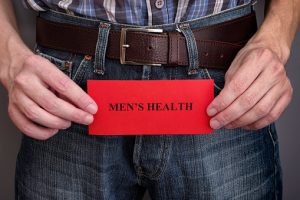 Prostate health is an important part of every man’s life and becomes more of an issue the older men get. It’s estimated that over 160,000 men in the U.S. are diagnosed with prostate cancer every year, and here at Bel Marra, we recognize this is a serious issue and have taken the time to compile a list of articles detailing benign prostatic hyperplasia, prostatitis, enlarged prostate, and prostate cancer risk. Staying informed and up to date with the latest information is what we are all about.
Prostate health is an important part of every man’s life and becomes more of an issue the older men get. It’s estimated that over 160,000 men in the U.S. are diagnosed with prostate cancer every year, and here at Bel Marra, we recognize this is a serious issue and have taken the time to compile a list of articles detailing benign prostatic hyperplasia, prostatitis, enlarged prostate, and prostate cancer risk. Staying informed and up to date with the latest information is what we are all about.
Enlarged prostate (benign prostatic hyperplasia) causes, signs, and symptoms
Benign prostatic hyperplasia (BPH) is a non-cancerous enlargement of the prostate. There are two prostate growth periods: one during early puberty and another around the age of 25. As it grows, the gland can press and pinch the urethra and the bladder walls thicken. Over time, the bladder can become weaker and lose its ability to empty fully. If the urethra continues to narrow and the bladder still can’t empty, complications associated with benign prostatic hyperplasia can arise.
Advertisement
Benign prostatic hyperplasia does not increase a man’s risk of developing prostate cancer. Prostate cancer begins in the outer peripheral zone and grows outward to invade surrounding tissue. In BPH, the growth moves inward toward the prostate’s core, causing the urethra to become tighter and making it difficult to urinate. Continue reading…
 Natural remedies and exercises for enlarged prostate (benign prostatic hyperplasia)
Natural remedies and exercises for enlarged prostate (benign prostatic hyperplasia)
By age 60, at least 50 percent of men will experience an enlarged prostate, or what is called benign prostatic hyperplasia (BPH). As a man ages, the chance of having an enlarged prostate increases. For example, by age 85, the likelihood jumps to 90 percent. The good news is, there are natural remedies for enlarged prostate glands and healthy exercises that can help.
When prostate enlargement or BPH goes untreated, it can cause problems with urine flow or lead to either a urinary tract infection or kidney malfunction. Some people with enlarged prostate have been prescribed medications, while others have experienced invasive surgery. Your symptoms, the size of your prostate, and any other health issues you might have should be taken into consideration by a doctor before a treatment option is decided on. In some cases, enlarged prostate treatment with natural remedies are all one needs. Continue reading…
 Avoid these 4 foods for a healthier prostate
Avoid these 4 foods for a healthier prostate
If you’re worried about the health of your prostate, it may be time to put down the burger and step away from the steak. Research has shown that certain foods may be detrimental to prostate health and increase your risk of serious health issues. So, which foods are the ones you need to avoid? Below you will find four of the worst foods for your prostate and how they impact the gland. Continue reading…
Prostatitis (prostate inflammation) causes painful urination, UTIs, and enlarged
 prostate increase risk
prostate increase risk
Prostatitis (prostate inflammation) causes painful urination, and urinary tract infections (UTIs) increase the risk of developing the condition. Prostatitis can be referred to as an infection of the prostate, but inflammation often occurs without a known infection. Roughly five to ten percent of prostatitis cases are caused by a bacterial infection, but luckily, it does not lead to an increased risk of prostate cancer.
Although an enlarged prostate commonly affects older men, men of all ages are prone to prostatitis, with 25 percent of hospital visits accounting for younger and middle-aged men.
There are three main types of prostatitis: acute bacterial prostatitis, chronic bacterial prostatitis, and chronic nonbacterial prostatitis. Acute bacterial prostatitis is a bacterial infection that causes inflammation that is typically uncommon but comes with severe symptoms. Chronic bacterial prostatitis occurs from recurrent urinary tract infections that enter the prostate gland. Symptoms may be similar to acute bacterial prostatitis but less severe and fluctuate. Lastly, chronic nonbacterial prostatitis is the most common form of prostatitis that presents urinary and pelvic pain for at least three to six months. Continue reading…
 Lower prostate cancer risk by drinking pomegranate juice daily
Lower prostate cancer risk by drinking pomegranate juice daily
Advertisement
With Father’s Day just around the corner, it’s important that we discuss issues dealing with men’s health, including the number one male health issue – prostate cancer. The week leading up to Father’s Day is designated as Men’s Health Week, so discussions about prostate and prostate cancer are generally more common around this time.
Prostate cancer occurs when cells in the prostate – a gland surrounding the neck of the bladder – grows abnormally and develops cancer. If left completely untreated, prostate cancer cells may eventually spread from the prostate, resulting in tumors in other parts of the body, particularly in the bones and lymph nodes.
What could be most troubling is, prostate cancer develops often without any warning. Many times, men don’t have symptoms at first, and when they do develop, the progression is slow. These can include urinary issues like slow urine flow and low frequency, blood in the urine or semen, reduced ability to get an erection, and painful ejaculation. Continue reading…
